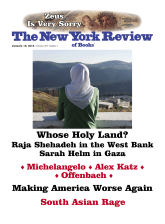In response to:
The Man Who Lost an Empire from the December 21, 2017 issue
To the Editors:
In his review of William Taubman’s biography of Mikhail Gorbachev [“The Man Who Lost an Empire,” NYR, December 21, 2017], Strobe Talbott also comments on two subsequent rulers of Russia: Boris Yeltsin and Vladimir Putin. Yeltsin, like the last leader of the Soviet Union, writes Talbott, “was loath to use force or risk instability as the world’s largest territorial state dismantled itself,” whereas Putin pursued a “scorched-earth strategy in subduing Chechen secessionists.” Yet it was Yeltsin in late 1994 who first chose force to crush Chechnya’s separatist movement, by launching a devastating war that entailed massive indiscriminate bombing of the capital city Grozny and smaller Chechen towns. Many thousands of civilians—Russian and Chechen alike—perished, and tens of thousands became refugees or internally displaced people.
Yeltsin’s “war of choice” to put down a mainly secular movement for autonomy sowed the seeds of the subsequent Islamist terrorism that has wracked the region since and reverberated in places as distant as Boston. In April 1996, almost a year and a half into the Chechen war, at a summit meeting with Yeltsin in Moscow, Talbott’s boss President Bill Clinton effectively endorsed Russia’s resort to force. “I would remind you that we once had a Civil War in our country,” said Clinton, fought “over the proposition that Abraham Lincoln gave his life for, that no State had a right to withdraw from our Union.” It is past time to recognize that the corruption and violence we condemn in Putin’s Russia began with Yeltsin, rather than with his hand-picked successor.
Matthew Evangelista
President White Professor of History and Political Science
Cornell University
Ithaca, New York
Strobe Talbott replies:
As Professor Evangelista says, Boris Yeltsin’s military operation against Chechnya in 1994 was an act of mass cruelty, and the resulting alienation of his liberal supporters was a self-inflicted blow to his presidency that weakened him politically. My reference to Yeltsin’s aversion to force concerned his resistance to revanchists bent on adjusting the borders of the USSR’s constituent republics to bring as many ethnic Russians as possible into an expanded, predatory, post-Soviet Russian Federation. Yeltsin’s opposition protected the Soviet Union from a decade-long bloodbath like the one that accompanied the breakup of Yugoslavia.
When it came to Chechnya, Yeltsin was dealing not with a newly independent state but with militant secessionism within the Russian Federation. He first tried to quell the movement with punitive raids targeted against rebel strongholds, but that strategy ended in debacles and further advances by the guerrillas. With more patience, subtlety, and time, Yeltsin might have negotiated a settlement that would have kept Chechnya in Russia. Even if a peaceful compromise was impossible, Yeltsin should have found means other than an all-out invasion that caused many thousands of casualties among Chechen civilians. Two years later he tried to make amends by granting Chechnya a high degree of autonomy, renouncing the future use of force, and accepting the elected nationalist president, Aslan Maskhadov.
As for the US government’s statements during that First Chechen War, I have written from experience as a member of the Clinton administration. In my memoir of US–Russia relations in the 1990s, The Russia Hand (2002), I acknowledged that we knew little about the Chechens’ side of the story and were inclined to accept Moscow’s, a shortcoming that skewed our analysis and policy. I also expressed regret over missing a chance to persuade President Clinton not to compare Yeltsin to Abraham Lincoln.
That said, those of us who met with Yeltsin in the early and mid-1990s could see that he was frustrated and enervated by the lethal chaos in the Caucasus. We had quite a different impression of Vladimir Putin when, as prime minister in 1999, he launched the Second Chechen War. After several murderous and still not fully explained bombings in Russian cities, he ordered a relentless air campaign against Chechnya. That assault was much more brutal than Yeltsin’s war, and it ended with the installation of Chechen leaders so thuggish, violent, and deeply entrenched that they have operated with impunity even in Moscow itself. Yet Putin’s popularity skyrocketed in Russia, clinching his succession to Yeltsin and anticipating what he is and does today.
This Issue
January 18, 2018
Damage Bigly
Divine Lust
This Land Is Our Land



